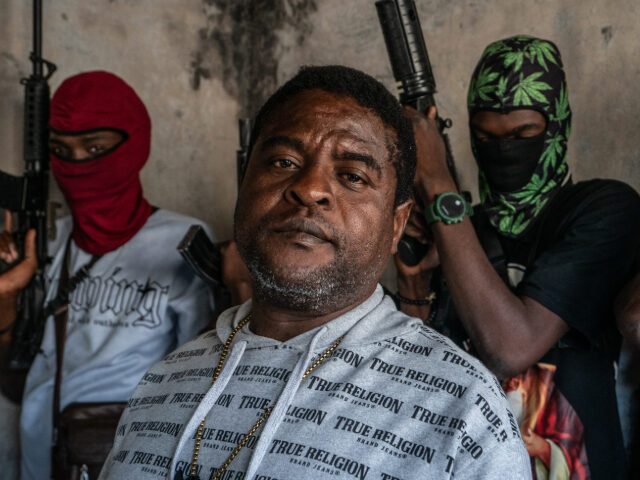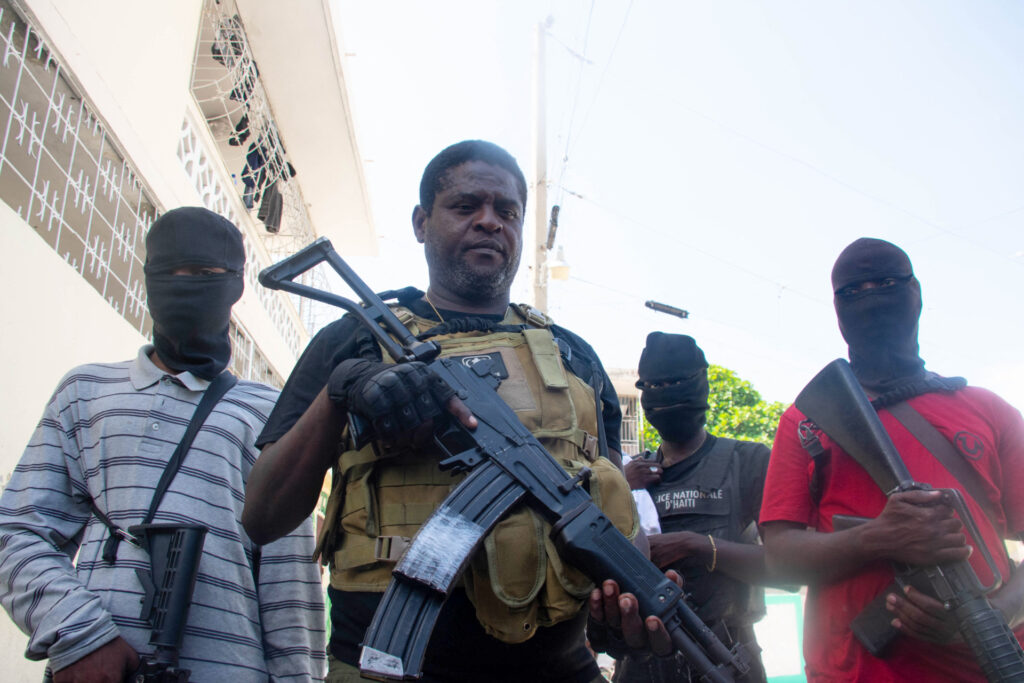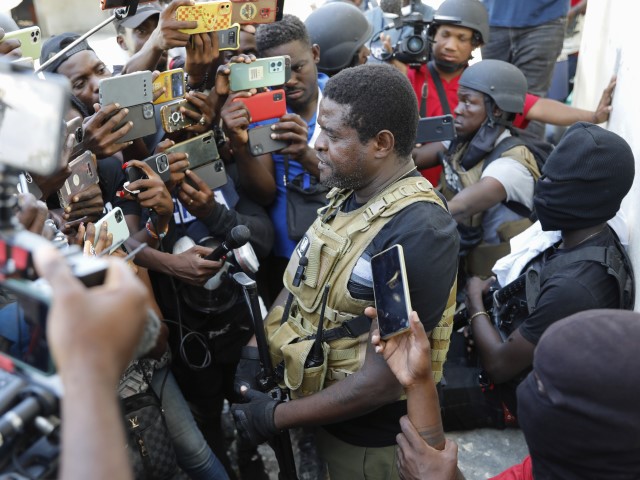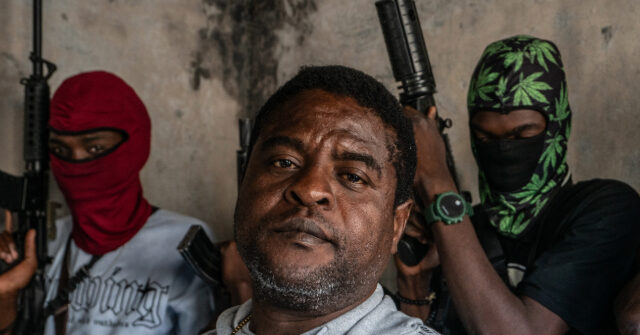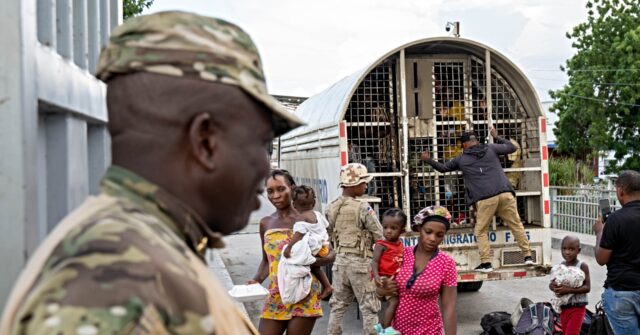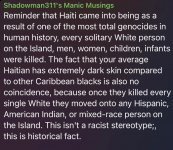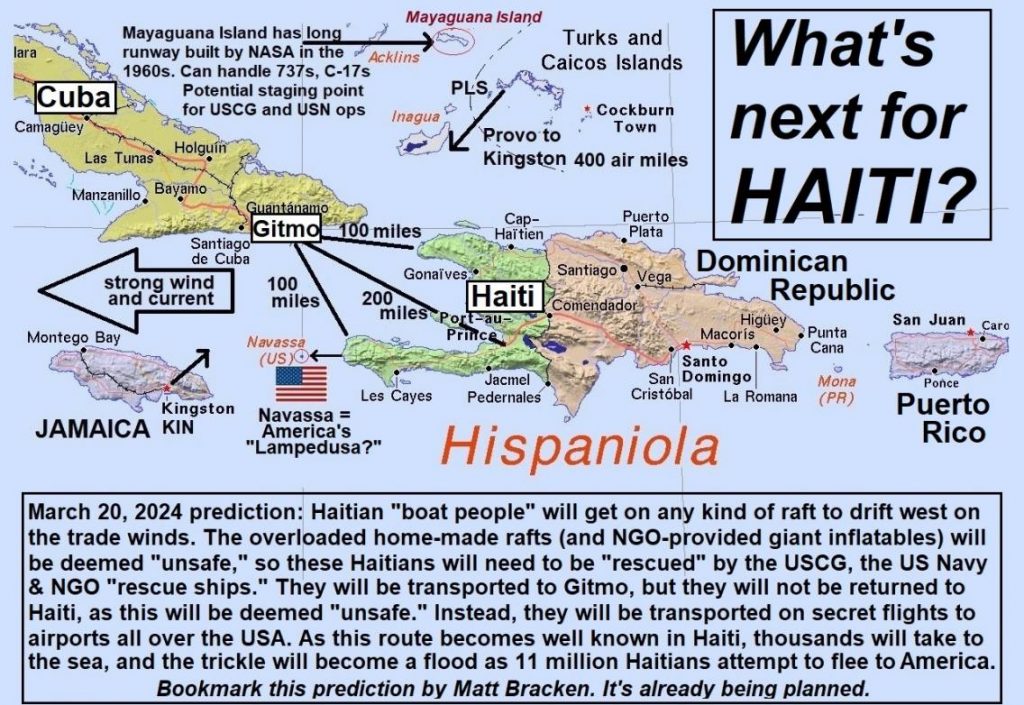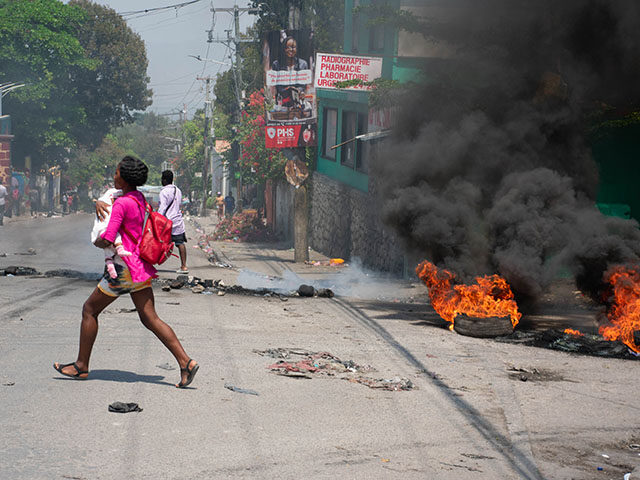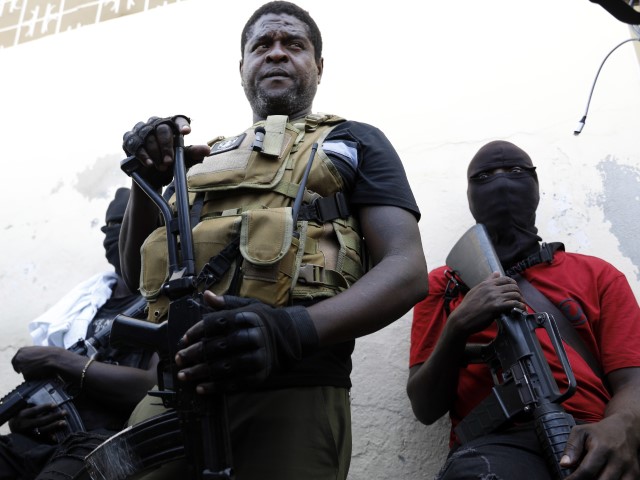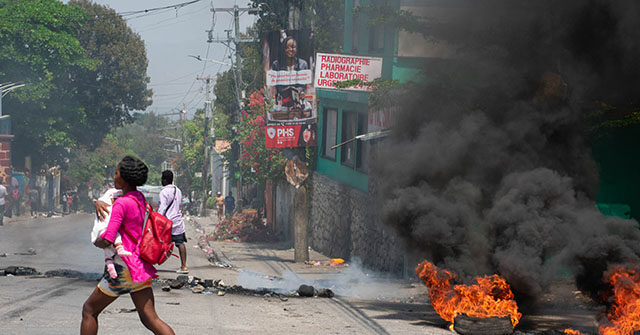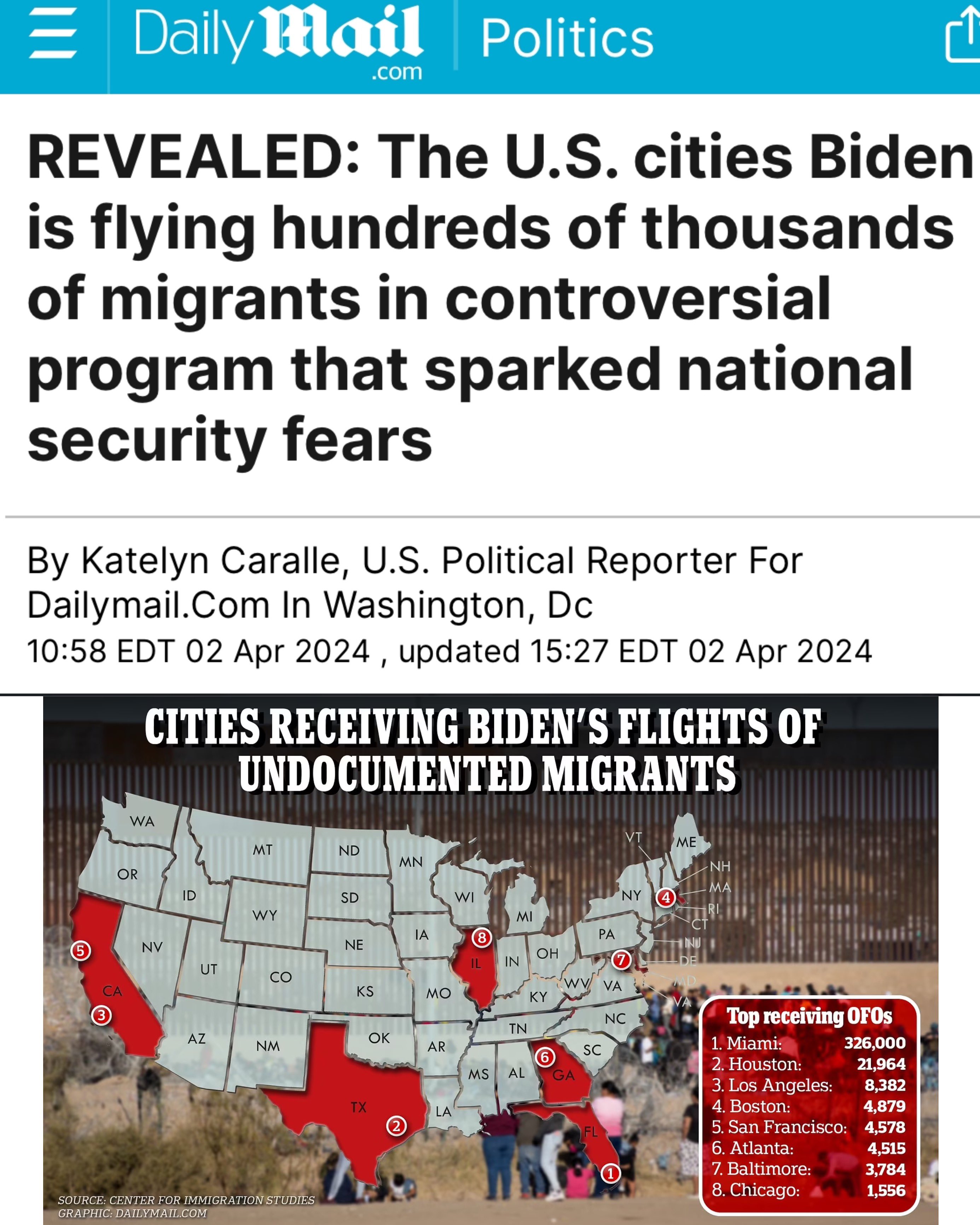Barbecue’s Biggest Rival in Haiti: a Gang Boss Rapper with a YouTube Award
Giles Clarke/Getty Images
With the
announced resignation of Prime Minister Ariel Henry, the most powerful man in blood-soaked Haiti is ex-cop gang boss Jimmy “Barbecue” Cherizier.
Barbecue is not without his rivals, foremost among them a 26-year-old rap-singing gangster named Johnson Andre, aka Izo Vilaj de Dye, whose resume includes kidnapping, extortion, savage murders, and a YouTube award for one of his music videos.
“Izo,” as he prefers to be known, began cranking out politicized rap videos shortly after a rival Haitian gang
abducted seventeen foreign missionaries in November 2021. The song, titled “Se Fot Yo,” accused the Haitian government of arming gangs and using them as paramilitary enforcers.
Izo’s YouTube channel quickly racked up 100,000 subscribers, which earned him a “Silver Play Button” plaque and a cash award from the video streaming service. Izo posed with his winnings in a social media snapshot and declared himself part of the “artist Mafia.”
This was not hyperbole because Izo
leads one of the deadliest Haitian gangs, Baz 5 Segonn, or the “Five Seconds Gang.” Cherizier’s rival gang, actually a confederation of smaller criminal packs, is called G9 and Family. There are
at least 200 distinct gangs operating in Haiti, with 23 of them competing for control of the capital city, Port-au-Prince.
Armed gang leader Jimmy “Barbecue” Cherizier and his men are seen in Port-au-Prince, Haiti, on March 5, 2024. (CLARENS SIFFROY/AFP via Getty Images)
Izo’s gang controls one of Haiti’s most miserable slums, the “Village of God,” where it practices such abuses as murder, rape, cop killing, recruiting child soldiers, and kidnapping. The U.S. Department of Justice (DOJ) has
prosecuted gang leaders linked to Izo for abducting American citizens.
A petition campaign was quickly organized to rescind Izo’s platinum award and shut down his YouTube channel.
“For the amount of violence and insecurity he is responsible for in Haiti, we cannot in good faith allow this individual to continue spreading his influence. He should be recognized globally for what he truly is and be banned from YouTube,” said Men Anpil, the group that organized the campaign.
The petition ultimately prevailed after accumulating more than 20,000 signatures, including one of 5 Segonn’s former kidnap victims, and Izo’s YouTube channel was
terminated for violating community guidelines in April 2023.
The rapping gang leader was booted off Facebook, Instagram, and WhatsApp in 2022 for a video in which he threatened to kill 30 people in revenge if any of his subjects in the Village of God were harmed. He made a point of telling his “soldiers” not to wait for orders from him to launch their murder spree.
Izo went on to
commit such a revenge crime in October 2023, kidnapping 38 people from two minibusses and seizing control of Haiti’s Supreme Court building in retaliation for the extrajudicial killing of one of his soldiers.
The petition against Izo’s YouTube award charged that he was not only using the platform to monetize crime and anarchy but also to recruit more young “soldiers” into his gang. Veteran observers of Haiti’s deterioration agreed that social media made the gangs far more powerful and vicious.
“The bandits would never have been as powerful as they are in Haiti without social media. We always had bandits in Haiti, but without these platforms, they would not be as famous,” Yvens Rumbold of Haitian think tank Policite
told the
Washington Post in June 2022, citing Cherizier and Izo as prime examples.
Some of those analysts see Izo as
more powerful than Cherizier, a loudmouth who gets foreign media attention by railing against the dilapidated Haitian government and
threatening “genocide” if other countries attempt to prop it up.
Cherizier postures as a revolutionary standing up for “the people” against their corrupt government, and he has mastered theatrical flourishes, such as posing with heavy weapons during press conferences (and, on one recent occasion,
popping off a few rounds to make the bullet points of his agenda literal). He masterminded some headline-grabbing terrorist actions, such as
blockading fuel and food deliveries at Haiti’s main port in 2021.
Jimmy Cherizier holds a press conference in the Delmas 6 neighborhood of Port-au-Prince, Haiti, on March 5, 2024. (Odelyn Joseph/AP)
Izo, on the other hand, has more thugs under his command and is more ruthless in protecting his criminal enterprises. He probably has more money than Cherizier, thanks to a thriving drug trade under his control, and he has a track record of winning turf wars against other gangs.
Izo is so confident of his power that he has been known to sell excess weapons to rival gangs for quick cash. He could prove much more difficult for a multinational peacekeeping force to subdue than Cherizier, whose influence derives largely from controlling the vital Varreux fuel terminal, which would almost certainly be the first asset secured by incoming peacekeepers. In contrast, Izo
controls a diverse assortment of maritime smuggling routes across Port-au-Prince, which makes his operations nimble and resilient.
Analysts
told ABC News on Tuesday that it will be nearly impossible to put together a post-Henry government in Haiti without gang leaders like Izo and Cherizier getting seats at the table. None of the gang leaders have yet responded in public to the plans for a transitional council and interim prime minister.
None of the seats on that transitional council have been set aside for Cherizier, Izo, or the other crime bosses. There seems to be a vague hope among the international community that the gangs will accept a leading role by former rebel leader Guy Philippe, who just finished serving time in U.S. prison on money laundering charges. Philippe’s close ally Moise Jean-Charles is slated to become one of the seven voting members of the transitional council.
Renata Segura of the International Crisis Group told ABC that Philippe is “one of the few politicians who has an open channel with gangs at this moment,” giving him “a foot in both worlds.”
Haitian gang leader Izo has a resume that includes kidnapping, extortion, savage murders, and a YouTube award for one of his music videos.

www.breitbart.com



